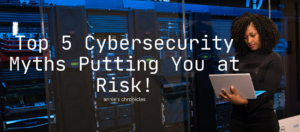Top 5 Cybersecurity Myths Putting You at Risk!
Cybersecurity is a widely known and spoken topic these days and yet there are so many misconceptions. These myths can leave individuals and businesses vulnerable to cyber threats. Let’s bust the top five cybersecurity myths and set the record straight.
1. “I’m Not a Target for Hackers”
Many people assume that cybercriminals only go after big corporations or high profile individuals. In reality, everyone is a target. Hackers often go for the easiest prey like small businesses, everyday internet users, and those who don’t take security seriously.
The reality is hackers are opportunistic. Even if you don’t think your data is valuable, it can still be used for:
- Identity theft (stealing your personal information to commit fraud).
- Credential stuffing attacks (reusing your stolen passwords to access other accounts).
- Selling data on the dark web (email addresses, passwords, and even browsing habits have value).
- Using your computer for botnet attacks (your device could be hijacked to perform cyberattacks).
How to Stay Safe:
- Use strong, unique passwords for every account (a password manager can help).
- Enable two-factor authentication (2FA) to add an extra layer of security.
- Be cautious with phishing emails, texts, and calls—never click on links from untrusted sources.
- Regularly check if your data has been compromised using tools like Have I Been Pwned (https://haveibeenpwned.com/).
2. “Antivirus Software Is Enough to Keep Me Safe”
While antivirus software is an essential layer of security, it alone won’t protect you from modern cyber threats. Cybercriminals use sophisticated techniques like phishing, ransomware, and social engineering which are things antivirus software can’t always detect.
Cybersecurity requires a multi-layered approach, including awareness, strong authentication, and secure browsing habits.
How to Stay Safe:
- Keep your software and operating system up-to-date.
- Avoid downloading software from unverified sources (even mobile apps can contain malware).
- Educate yourself on phishing and scam tactics. An antivirus won’t stop you from falling for a well-crafted phishing email.
3. “Public Wi-Fi Is Safe If It Has a Password”
Cafés, airports, hotels, and co-working spaces often offer free Wi-Fi with a password, making it seem secure. However, password protected Wi-Fi is not the same as encrypted Wi-Fi and that’s where the risk lies. Hackers can set up fake Wi-Fi hotspots or use tools to intercept data on public networks.
Public Wi-Fi is a hotspot (pun intended) for cybercriminals looking to steal login credentials, credit card information, and personal data.
How to Stay Safe:
- Avoid logging into sensitive accounts such as banking, email, or work portals on public Wi-Fi.
- Use a VPN (Virtual Private Network) to encrypt your internet connection.
- Turn off automatic Wi-Fi connections to prevent your device from connecting to rogue networks.
- If you must use public Wi-Fi, stick to HTTPS websites for added security.
4. “Cybersecurity Is Just an IT Problem”
Many businesses and individuals believe that cybersecurity is something only IT professionals should worry about. In reality, human error is one of the biggest security risks. It could be from falling for phishing scams to using weak passwords. Cybercriminals don’t always attack networks directly; they exploit human vulnerabilities
The truth is cybersecurity is everyone’s responsibility, whether you’re a CEO, employee, or freelancer. Even at home, poor security habits can lead to identity theft or hacked accounts.
How to Stay Safe:
- Educate yourself, your friends and family and your team on cybersecurity best practices.
- Regularly update and secure your personal devices.
- Think before you click especially in emails or text messages from unknown senders.
5. “Hacked? There’s Nothing I Can Do About It”
If you’ve been hacked, don’t assume all is lost. Taking immediate action can help you mitigate the damage and even prevent future attacks.
Acting fast can reduce financial losses, protect your identity, and prevent further security breaches. Hackers rely on their victims not taking action. The longer you wait, the worse it gets.
How to Respond to a Cyber Attack:
- Change your passwords immediately (use a strong and unique one).
- Check your bank statements for suspicious activity.
- Run a security scan on your devices to remove any malware.
- Enable multi-factor authentication to add an extra layer of security.
- Report the breach to relevant authorities (your bank, IT team, or cybersecurity professionals).
Cybersecurity isn’t just for tech experts. It’s something everyone should take seriously. I’m busting these myths for you so that you can strengthen your security habits and stay ahead of cyber threats. Stay safe, stay informed, and never assume you’re not a target.

